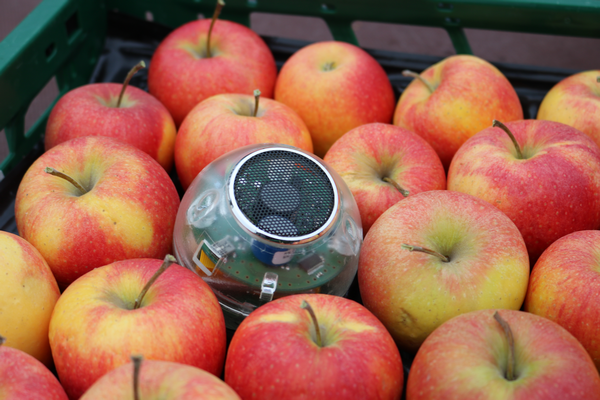New Project anounced at the Model-It in Potsdam: Digital Twins to reduce Food Waste during Cold Storage
Reducing spoilage of fresh foods such as apples during storage is the goal of a new project by the University of Bremen and the Leibniz Institute for Agricultural Engineering and Bioeconomy (ATB) in Potsdam. The project will be supported with 600,000 euros until 2026.

The sensor measures oxygen and carbon dioxide to determine the breathability of the fruit. © Foltan/ATB
Digital Twin: Hardly Used in Food Logistics until Now
"Proper humidity management is important," explains Dr. Pramod Mahajan, principal investigator at the Leibniz Institute for Agricultural Engineering and Bioeconomy (ATB) in Potsdam. "Cooling is switched on and off cyclically to save energy and if the fluctuations in temperature and humidity are too great, this has a detrimental effect on the quality of the fruit. If the humidity is too high, water condenses on the fruit and microorganisms find ideal growth conditions." If, on the other hand, it is too low, the fruits lose weight through evaporation.
The aim of the project Fruity Twin is to achieve optimal storage conditions with a suitable degree of condensation. For this purpose, Dr. Reiner Jedermann, a post-doctoral researcher in electrical engineering at the University of Bremen, and Dr. Pramod Mahajan want to transfer the concept of the digital twin, which has previously been used in industrial processes, to food storage. "Until now, data had to be transferred 'by hand' between incoming measurement data and the various models," says Reiner Jedermann from the Institute for Microsensors, -actuators and -systems (IMSAS) at the University of Bremen. "Digital twins now make it possible to implement all models and software components on a common platform."
A digital twin is as close a replica as possible of the real fruit, albeit on a computer platform. You can look inside the fruit, so to speak, and scan various properties that are difficult or impossible to measure directly. "By developing a digital twin, the project envisions a future in which virtual experiments and predictive capabilities protect the quality of fruit," says Pramod Mahajan. "The virtual experiments allow effects of changes to cooling parameters to be tested on the computer first before adjustments are made to the 'real' cooling unit.” Cooling cycles can be dynamically adjusted to the current condition of the fruit and water condensation on the fruit can be controlled. In this way, storage conditions can be managed more precisely and product losses can be significantly reduced.
Ten Years of Fighting Food Waste
The "Fruity Twin - Digital Twin for Condensation Management during Cold Storage of Fruits project is scheduled to run for three years and is being supported by the German Research Foundation (DFG). For ten years now, the University of Bremen and the ATB in Potsdam have been conducting research into how food waste can be reduced or prevented. It all started with the Intelligent Container. In this way, they are making an important contribution to Goal 12 of the Global Sustainability Strategy – "Produce and consume sustainably."
Further Information:
Institut für Mikrosensoren, -aktoren und –systeme
Leibniz-Institut für Agrartechnik und Bioökonomie (ATB)
The project “Digital Twin for Condensation Management during Cold Storage of Fruits project” is supported by the German Research Foundation (DFG) under grand number 521409147.






